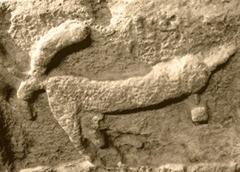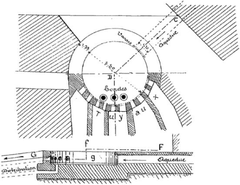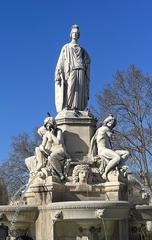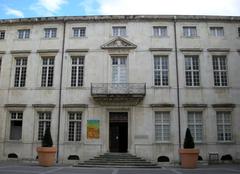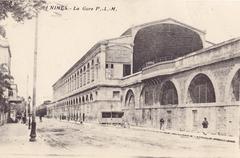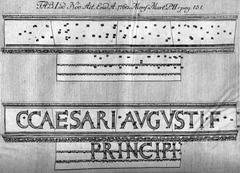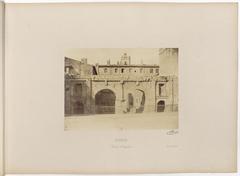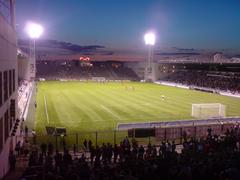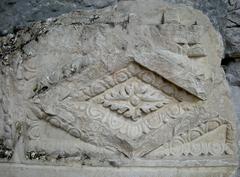Petit Temple de Nîmes: Visiting Hours, Tickets, and Comprehensive Travel Guide
Date: 04/07/2025
Introduction
Nestled in the vibrant heart of Nîmes, France, the Petit Temple de Nîmes is an exceptional cultural and historical landmark that tells the story of the city’s evolving religious, architectural, and civic identity. Unlike Nîmes’ more famous Roman monuments such as the Maison Carrée or the Arènes, the Petit Temple stands as a testament to the city’s post-Roman transformation—from a Catholic Ursuline chapel to a Protestant house of worship. Its Baroque Provençal architecture, rich artistic heritage, and role as a center for cultural and community life make it a must-see for visitors exploring Nîmes’ deep historical layers.
This guide offers a detailed overview of the temple’s origins, transformation, current restoration, visiting hours, ticketing, accessibility, nearby attractions, and practical travel tips. Whether you are a history buff, architecture enthusiast, or cultural traveler, the Petit Temple de Nîmes promises a rewarding and memorable experience. (Nîmes Tourisme, Midi Libre, Carnets de Balades, Cityzeum)
Historical Overview
Ursuline Foundation (1714–1793)
The Petit Temple was originally constructed between 1714 and 1718 as the chapel for the Ursuline convent, a Catholic order known for its educational and charitable mission. Its creation during the Counter-Reformation era reflects the religious dynamism of southern France, with the Ursulines contributing to the city’s educational and spiritual life. The building’s Baroque Provençal style, characterized by harmonious proportions and restrained ornamentation, is emblematic of early 18th-century ecclesiastical architecture in the region. (Carnets de Balades, Wikipedia)
Protestant Transformation and Adaptive Reuse (1793–Present)
With the upheavals of the French Revolution and the secularization of church property, the Ursuline chapel was repurposed for Protestant worship in 1795, symbolizing the re-emergence of Protestantism in a city historically known as “la Genève française.” The interior was adapted to Protestant liturgy, emphasizing simplicity, unity, and a focus on preaching and music. The acquisition of the building by Alexandre Vincens-Vals and the installation of the historic Barbut bell (1802) marked the start of a new chapter in the temple’s life, making it a focal point for Nîmes’ Protestant community. (Navaway, Le Réveil du Midi)
Architectural Features and Artistic Heritage
Exterior
- Style: Baroque Provençal, using local stone and balanced ornamentation.
- Façade: The east façade features a modest portal, arched windows, and an understated bell tower housing the historic 1802 bell.
- Stone Arch: The main entrance is framed by a robust stone arch, typical of Protestant temples in the region.
Interior
- Nave: A single, rectangular nave with a flat ceiling, designed for communal worship.
- Woodwork: Original walnut boiseries, pews, and pulpit, with a remarkable 18th-century walnut organ case by Jean-Esprit Isnard as a centerpiece.
- Natural Light: Large arched windows with clear glass provide abundant daylight, reinforcing the temple’s serene and welcoming atmosphere.
- Finishes: Lime plastered walls in light tones and subtle cornices complete the refined interior.
(Carnets de Balades, Fondation du Patrimoine)
Current Restoration and Future Vision
A major restoration campaign is underway (2025–2027), with a €1.55 million budget sourced from church funds, private donations, public authorities, and cultural foundations. The project is divided into two phases:
- Phase 1 (2025–2026): Restoration of the east façade, bell tower, stonework, roof, and window frames; scheduled for provisional reopening in early 2026.
- Phase 2 (2026–2027): Restoration of the remaining façades, replacement of parquet floors, repainting, modernization of facilities, and enhanced accessibility.
The renovation aims to secure the building’s structural integrity, improve visitor comfort, and transform the Petit Temple into a multi-purpose space for religious services, cultural events, concerts, exhibitions, and community gatherings with a capacity of up to 200 people. (Midi Libre, Fondation du Patrimoine)
Visiting Hours and Ticket Information
Current Status
- Closed for Restoration: The Petit Temple is currently closed to the public. Provisional reopening is expected in early 2026; full completion by early 2027.
Anticipated Opening Hours (Post-Restoration)
- Regular Hours: Tuesday to Sunday, 10:00 AM to 6:00 PM. Extended hours for special events.
- Entry: Free admission; donations welcomed for restoration support.
- Guided Tours: Available upon request and through the Nîmes Office of Tourism. Tours offer in-depth insights into the temple’s history and architecture.
Accessibility
The restoration includes significant upgrades for persons with reduced mobility (PMR), including ramps and adapted facilities. Modern climate control and lighting systems have been discreetly integrated for year-round comfort. (Fondation du Patrimoine)
How to Get There
- Address: 19, rue du Grand-Couvent, 30000 Nîmes, France
- By Foot: 100 meters from Maison Carrée; near the city’s main attractions.
- Public Transport: Accessible via Nîmes’ bus network, with stops close by.
- Parking: Limited in the immediate vicinity; public parking available on the city’s outskirts, within walking distance.
(Carnets de Balades, Cityzeum)
Nearby Attractions
Combine your visit to the Petit Temple with these highlights:
- Maison Carrée: A UNESCO-listed Roman temple.
- Arènes de Nîmes: One of the world’s best-preserved Roman amphitheaters.
- Jardins de la Fontaine: A tranquil park with Roman ruins.
- Musée de la Romanité: A modern museum dedicated to Nîmes’ Roman heritage.
Enjoy nearby cafés, restaurants, and shops in the vibrant old town. (Cityzeum, Trip USA France)
Cultural Events and Visitor Experience
The Petit Temple is envisioned as a lively venue for concerts, exhibitions, lectures, and community gatherings. Check local listings and the temple’s official communications for event schedules post-renovation. (Le Réveil du Midi)
Frequently Asked Questions (FAQ)
Q: What are the current visiting hours?
A: The Petit Temple is closed for restoration; reopening is expected in early 2026.
Q: Is entry free?
A: Yes, entry will be free; donations are appreciated.
Q: Are guided tours available?
A: Yes, guided tours will be available upon request and can be booked via the Nîmes Office of Tourism.
Q: Is the site accessible for persons with reduced mobility?
A: Yes, the restoration includes full accessibility features.
Q: Can I attend cultural events?
A: Yes, the Petit Temple will host diverse cultural and community events post-renovation.
Practical Visitor Tips
- Stay Informed: Check the Nîmes Tourisme and Église Protestante Unie de Nîmes websites for updates.
- Plan Ahead: Combine your visit with other key sites for a comprehensive cultural experience.
- Explore Local Life: Take time to enjoy the local cafés and shops around the temple.
- Photography: The temple’s Baroque façade and walnut organ case are especially photogenic.
- Consider Accessibility: Facilities will be fully accessible post-restoration.
Visuals and Resources
- Images: Exterior façade with alt text “Petit Temple de Nîmes Baroque façade”; interior view with “18th-century walnut organ case in Petit Temple de Nîmes”; location map with “Map showing Petit Temple de Nîmes in historic center.”
- Virtual Tours: Available on local tourism websites.
Conclusion
The Petit Temple de Nîmes is not only a monument of religious and architectural significance but also a living testament to the city’s evolving identity—from Catholic Ursuline chapel to vibrant Protestant and community center. As it undergoes vital restoration, the temple is poised to become a dynamic hub for culture, dialogue, and heritage in Nîmes. Be sure to include it in your itinerary, stay updated on reopening details, and immerse yourself in the city’s unique blend of history and modern life.
Call to Action
Stay connected with the latest updates on the Petit Temple de Nîmes by visiting the Nîmes Tourisme website. Download the Audiala app for guided tours and insider tips, and follow us on social media for news, events, and travel inspiration.
Sources and Further Reading
- Petit Temple de Nîmes - Nîmes Tourisme, 2025
- Les travaux de rénovation du Petit Temple dans l’écusson nîmois sont désormais lancés - Midi Libre, 2025
- Nîmes Le Petit Temple - Carnets de Balades
- Petit Temple de Nîmes - Cityzeum
- Visiting Nîmes and Petit Temple Historical Context - The South of France
- Petit Temple de Nîmes at Temples Free
- Petit Temple de Nîmes - Navaway
- Le Réveil du Midi - Cultural Events at Petit Temple
- Waves and Cobblestones - Best Things to Do in Nîmes, France
- France.fr - Nîmes Travel and History
